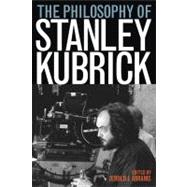The Philosophy of Stanley Kubrick
, by Abrams, Jerold J.- ISBN: 9780813192208 | 081319220X
- Cover: Paperback
- Copyright: 2/13/2009
In the course of fifty years, director Stanley Kubrick produced some of the most haunting and indelible images on film. His films touch on a wide range of topics rife with questions about human life, behavior, and emotions: love and sex, war, crime, madness, social conditioning, and technology. Within this great variety of subject matter, Kubrick examines different sides of reality and unifies them into a rich philosophical vision that is similar to existentialism. Perhaps more than any other philosophical concept, existentialismthe belief that philosophical truth has meaning only if it is chosen by the individualhas come down from the ivory tower to influence popular culture at large. In virtually all of Kubrick's films, the protagonist finds himself or herself in opposition to a hard and uncaring world, whether the conflict arises in the natural world or in human institutions. Kubrick's war films (Fear and Desire, Paths of Glory, Dr. Strangelove,andFull Metal Jacket) examine how humans deal with their worst fearsespecially the fear of deathwhen facing the absurdity of war.Full Metal Jacketportrays a world of physical and moral change, with an environment in continual flux in which attempting to impose order can be dangerous. The film explores the tragic consequences of an unbending moral code in a constantly changing universe. Essays in the volume examine Kubrick's interest in morality and fate, revealing a Stoic philosophy at the center of many of his films. Several of the contributors find his oeuvre to be characterized by skepticism, irony, and unfettered hedonism. In such films asA Clockwork Orangeand2001: A Space Odyssey,Kubrick confronts the notion that we will struggle against our own scientific and technological innovations. Kubrick's films about the future posit that an active form of nihilism will allow humans to accept the emptiness of the world and push beyond it to form a free and creative view of humanity. Taken together, the essays inThe Philosophy of Stanley Kubrickare an engaging look at the director's stark vision of a constantly changing moral and physical universe. They promise to add depth and complexity to the interpretation of Kubrick's signature films.






